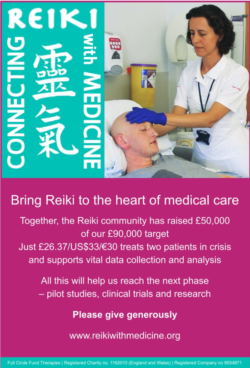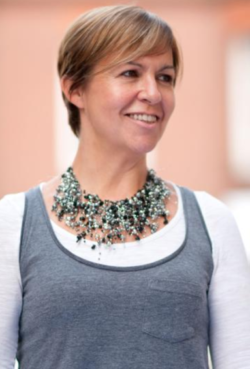3rd Anniversary of Reiki at St Georges
St George’s Hospital Tooting is a world class teaching and research hospital based in South London. With the huge support of its associated complementary therapy charity, Full Circle Funding Therapies, and immense injections of persistence and fundraising, it has become the setting for a landmark project called Connecting Reiki with Medicine.
The aim is ambitious but simply stated: to introduce, evaluate and research Reiki in clinical practice. CRWM sees Reiki as a simple hands-on therapeutic system that can be helpful to both the body and mind with various studies suggesting that energy-based therapies can help ease patients’ pain (Evanoff and Newton 1999; Turner et al., 1998; Baldwin et al., 2017).
CRWM aims to add to the understanding of how Reiki improves patients’ quality of life by collecting case studies, undertaking evaluations and supporting further research. The information collected will then support the use of Reiki at St George’s Hospital and other clinical settings.

One of the most commonly reported effects of Reiki is that of relaxation or a reduction in stress. It is believed that a link may exist between ‘energy’ therapies and activation in the autonomic nervous system (ANS) (Mackay et al., Ramnarine-Singh,1999).
For instance, Wardell and Engebretson (2001) measured the biological effects of Reiki on the ANS and found significant reduction of anxiety and systolic blood pressure, and a significant increase in salivary immunoglobulin A (IgA) levels.
Full Circle has a research committee that includes medical consultants and researchers and has established links with research institutions in the UK and elsewhere and it aims to disseminate findings of how Reiki may help in hospitals, including supporting families and very sick children on the paediatric wards.
The Reiki project also intends to look at how Reiki supports cancer, sickle cell and palliative care patients.
While this is currently a pilot project, further down the road, Full Circle Fund Therapies’ aim is to create a transferrable clinical training and mentoring programme which allows Reiki practitioners to work on acute and high dependency units in a way which can be accepted by the medical professions.
Training is taking place on the bone marrow and transplant wards, and is planned as well for paediatric medicine.
In order to fund the work donations are being raised to support different elements of this visionary project including the provision of a rigorous, clinical training as part of Full Circle’s commitment to evidence based, best practice in acute medical settings, including an extensive clinically-based mentoring programme for joining practitioners, data gathering, confidential data management, preparation of reports and case studies, analysis and systematic review of quantitative and qualitative data to support rationale for future research into the application of Reiki in various diverse and complex medical environments.
This project also includes the work of a post graduate Research Assistant [typically a PhD graduate or similar], an Academic Research Lead based at St George’s University of London (or another recognised research institution and as directed by Full Circle’s Research Committee).
Connecting Reiki with Medicine (CRWM) now has a team of six experienced, professional Practitioners offering Reiki treatments to some of the sickest patients at St George’s Hospital. Four are ‘seasoned’ team members and two are in the final straits of their training in acute clinical settings.

Donations: http://www.totalgiving.co.uk/charity/full-circle-fund-therapies
Video: https://www.youtube.com/watch?v=5qV0s1VU5Z4&t=82s
PowerPoint presentation: https://www.youtube.com/watch?v=5GCDzt0IjhI&feature=share
Website: http://www.reikiwithmedicine.org
References Mackay, N., Hansen, S., McFarlane, O. (2004) Autonomic Nervous-System-Changes During Reiki Treatment: A Preliminary Study, The Journal of Alternative & Complementary Medicine (10) 6., 1077-1081.
Ramnarine-Singh, S. (1999) The surgical significance of therapeutic touch. AORN J 69:358–369.
Turner, J., Clark, A., Gauthier, D., Williams, M. (1998) The effect of therapeutic touch on pain and anxiety in burn patients. Journal of Advanced Nursing, 28, 10–20.
Wardell, D., Engebretson, J. (2001) Biological correlates of Reiki Touch healing. Journal of Advanced Nursing 33, 439– 445.
Baldwin, A., Vitale, A., Brownell, E., Kryak, E., Rand. W. (2017) Effects of Reiki on Pain, Anxiety, and Blood Pressure in Patients Undergoing Knee Replacement: A Pilot Study. Journal of Holistic Nursing Practice; 31(2):80-89.